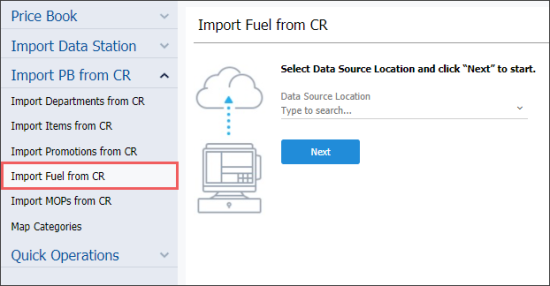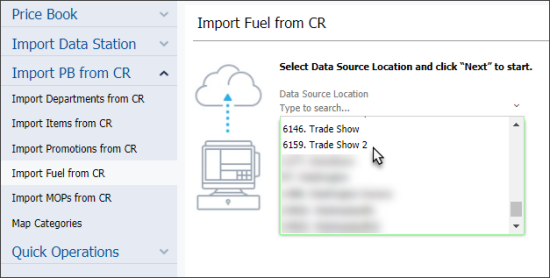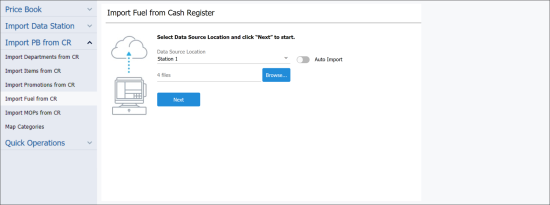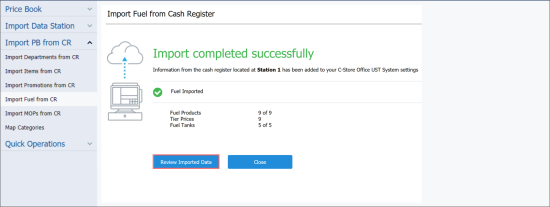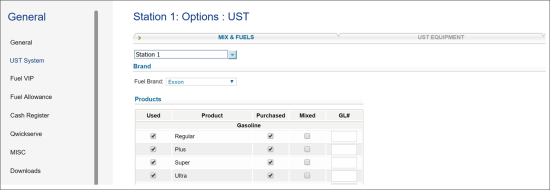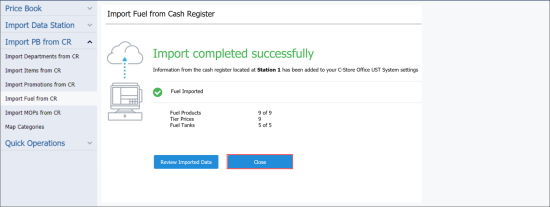The Import Fuel from Cash Register module of the Import Tool allows you to pull information about fuel products and their settings from the cash register and import it to CStoreOffice®. You can use this module to quickly synchronize fuel data between cash registers and CStoreOffice® by locations.
The Import Fuel from Cash Register module is supported only by the following cash registers:
- Verifone Ruby/Sapphire
- Verifone Ruby/Topaz
- Verifone Ruby Commander
- Gilbarco Passport
You can import the following fuel data to CStoreOffice®:
- Set of fuel products
- Information about fuel grades
- Tank settings
- Fuel tier pricing
Fuel data can be imported in two ways:
- Automatically: You can load fuel data directly from the cash register.
- Manually: You can import fuel data from a set of files in the XML format stored locally.
Fuel data is imported from the cash register or files as an entire set. Once the data is imported, it becomes available in CStoreOffice® and you can work with it as usual.
Importing Fuel Data from Cash Register
To import fuel data to CStoreOffice®:
- In CStoreOffice®, go to Price Book > Import Tool.
- In the Import PB from CR section, select Import Fuel from CR.
- From the Data Source Location list, select a location from which you want to import fuel data.
To quickly find the necessary location, in the Type to search field, start typing the location name. The Import Tool will display all variants that match the name you enter.
- If you want to import data directly from the cash register, leave the Auto Import toggle in the On position and click Next.
If you want to import data from a set of XML files, set the Auto Import toggle to the Off position, then click Browse and select the files from which data must be imported. You can import data from the following files:
- Fuel Grade Maintenance (FGT.xml): This file contains information about fuel grades. The FGM.xml file is mandatory for import.
- Fuel Product Maintenance (FPT.xml): This file contains information about fuel products. The FPT.xml file is mandatory for import.
- Fuel Price Maintenance (FPM.xml): This file contains information about fuel grade selling for each fueling position, including the time tier, price tier and service level. The FPM.xml file is optional for import. If you want to import data from this file, you must import FGT.xml and FPT.xml files as well.
- Tank Product Maintenance (TPT.xml): This file contains information about retail site tanks, including products contained in tanks, tanks capacity and other tank vital statistics. The TPT.xml file is optional for import. If you want to import data from this file, you must import FGT.xml and FPT.xml files as well.
After you select the files for import, click Next.
If fuel maintenance data is not available at the cash register, the Import Tool will offer only the manual data import option.
- At the next step, the Import Tool imports the fuel data from the specified location or set of files to CStoreOffice®. The import process takes a while.
Once the fuel data is imported, the Import Tool displays a brief summary with the import results. You can also check the import results details. To do this, click Review Imported Data.
Result: CStoreOffice® displays the form with the imported fuel information.
To close the Import Fuel from Cash Register module, click Close.
If a new fuel product is created for a location as a result of fuel data import, CStoreOffice® automatically reprocesses shifts that have unknown fuel sales events and updates information in these shifts.
